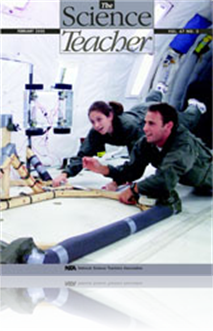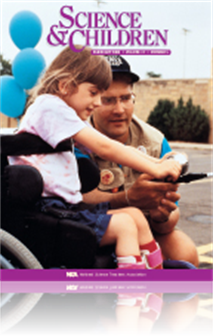All Resources
Journal Article
Editorial: Where There's a Market, There's a Way: Student Entrepreneurs—Filling a Niche in Education
The Journal of College Science Teaching’s editor shares thoughts regarding the current issue. ...
Journal Article
To bridge the textbook compartmentalization of science courses and to bring the spirit of interdisciplinary investigation into the classroom, the author uses scuba technology as a high interest, practical example that requires a working knowledge of ...
Journal Article
Wilson A. Bentley, an American naturalist, studied precipitation whenever he could spare a few moments away from his dairy farm. Rain, sleet, hail, snow—it made little difference—Bentley simply loved precipitation! Almost a century ago he develop...
Journal Article
Observational Journals: An Aid to Sky Watching: A Stellar Exercise—Predicting Events in the Sky
The endless procession of the Sun, Moon, and stars allows science students to fashion predictive models by keeping their own observational journals. Through careful recordkeeping, classroom discussion, and reflective writing, students’ work progres...
Journal Article
Blow-by-Blow Inquiry: Students use their minds and lungs in this engaging inquiry activity
To promote the spirit of science as inquiry, this article presents an engaging activity that capitalized on students’ interest in the homerun-hitting race between professional baseball players Mark McGwire and Sammy Sosa. Third-grade students were ...
Journal Article
This column shares reflections or thoughtful opinions on issues of broad interest to the community. This month’s issue focuses on Astrobiology—the investigation into the possibility of extraterrestrial life—a topic that both captures the public...
Journal Article
Commentary: Tips for Successful Presentations
An opinion piece about presentations and tips for making them successful. ...
Journal Article
The author, a professor at SUNY Geneseo, reports on her experiences using primary literature as the major focus of a seminar on evolutionary biology. Having discovered that the choice of articles can be the key to student understanding of scientific ...
Journal Article
Incorporating the issue of non-native species into science curricula is an effective way to protect our deteriorating environment while teaching students fundamental principles of ecology. In addition, the ubiquitous nature of the problem allows stud...
Journal Article
Blowing Bubbles: An Interdisciplinary Science and Mathematics Lab
Are you looking for an inexpensive, hands-on way to introduce the nature of molecules, surface tension, light waves, and color? How about blowing bubbles? Allowing middle school students to explore abstract mathematics and scientific concepts concret...
Journal Article
The world’s population is increasing at a phenomenal rate. One of the resources this growing population relies on now, and will rely on more as nonrenewable resources are used up, is wood. Currently, wood is used for building shelter and furniture,...
Journal Article
Editor's Note: 'Tis the Season for Outdoor Learning
Science and Children’s editor shares thoughts regarding the current issue....
Journal Article
Research and Teaching: Conceptual Change in Introductory-Level Astronomy Courses
As part of a project to transform an introductory astronomy course (Bisard and Zeilik, 1998), the authors developed, validated, and presented a set of multiple-choice questions to hundreds of students at the University of New Mexico (UNM) and Central...
Journal Article
Think about invertebrates for a minute. Do arthropods come to mind? The phylum Arthropoda is the most diverse of the invertebrates, spanning from horseshoe crabs to lobsters to insects. These organisms have in common their exoskeletons, segmented bod...
Journal Article
In a final class project, art and communications students taking science and mathematics courses at Chicago’s Columbia College and the Illinois Institute of Art produce a significant creative work using a media of their own choosing. In this articl...
Journal Article
SCST: Changes in Science Education—Are We Getting Ready? Predicting Education’s Future
In this column the leadership of SCST shares its views with JCST readers. This article's focus is on the new millennium which establishes a natural marking point for change. Reflection on the last 10 years might give some insight into the direction w...






